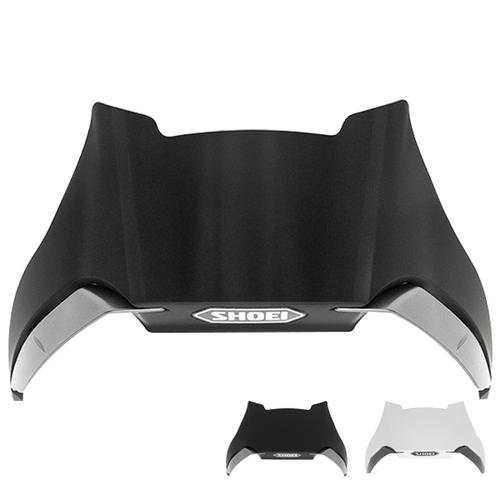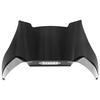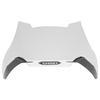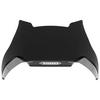Shoei X-14 Rear Stabilizer Street Bike Racing Motorcycle

Shoei X-14 Rear Stabilizer Street Bike Racing Motorcycle Helmet Accessories.
FEATURES:
- Fits the Shoei X-14 Helmet
Around every corner is a brand new adventure, and with that comes the uncontrollable desire to push the limits while exploring the exciting unknown. We at SHOEI know that feeling quite well, which is precisely why we never stop pushing progression within our line of premium motorcycle helmets. Enter the all-new RF-1200.
With a world-class team of designers and engineers leading the charge, SHOEI utilized its 55-year wealth of knowledge, state-of-the-art wind tunnel facility, proprietary materials, and the industry’s most stringent quality assurance practices to develop the next-generation RF. A lighter, more compact, streamlined helmet with next-level functionality, SHOEI’s RF-1200 has evolved the pursuit of perfection to an all-new level.
The state-of-the-art wind tunnel facility at SHOEI’s Ibaraki factory is an integral part of the helmet design process. Thanks to time well spent in the tunnel from its very beginning stages of development, the RF-1200 boasts a more compact and aerodynamic shell than its predecessor, earning praise and appeal as SHOEI’s lightest Snell-certified full-face model to date. Additionally, the RF-1200 offers a reduction in wind noise without blocking the road’s “informative sounds” thanks to its optimal shell aerodynamics and liner components that have been designed to prevent unwanted road noises from entering through the bottom of the helmet.
Utilizing SHOEI’s wind tunnels to help reveal the optimal balance between airflow and silence, SHOEI engineers equipped the all-new RF-1200 with a large, three-position lower vent shutter for ease of use with riding gloves, three upper air vents for optimal air intake, and four uniquely-positioned upper exhaust outlet vents to take better advantage of negative pressure suction—all yielding dramatically-improved cool–air intake and hot–air expulsion.
The RF-1200’s CWR-1 shield provides a vast field of vision that rivals helmetless peripheral. In addition to protecting against 99% of the sun’s damaging UV rays, the CWR-1 shield offers a distortion-free view throughout the entire range thanks to SHOEI’s 3D injection-molding process. Additionally, innovative new ribs on the top and bottom edge of the shield improve rigidity and eliminate the bending that may occur from wind pressure and during the opening and closing process, and an improved shield locking mechanism rounds out SHOEI’s most advanced shield system to date.
Coupled with the CWR-1 shield, the RF-1200’s all-new QR-E base plate system facilitates quicker shield changes than ever before. Once a shield is installed, the strengthened spring-loaded base plates pull the shield back against the dual-lip, dual-layered window beading to ensure a wind and waterproof seal with each and every closure. Add to the mix an all-new five-stage rotating dial that allows fine-tuning the base plate’s function more precisely than ever, and you’re left with the most advanced base plate/shield combination on the market today.
The all-new RF-1200 comes equipped with a Pinlock Fog-Resistant System, offering the most effective anti-fog protection in existence. A simple, one-step installation process makes every Pinlock lens easy to install.
Few characteristics of a motorcycle helmet are as critical as its first-layer defense, which is precisely why the new RF-1200 features the SHOEI-exclusive Multi-Ply Matrix AIM+ Shell construction. Combining fiberglass with organic fibers, the RF-1200’s proprietary AIM+ Shell is not only incredibly strong, it is extremely lightweight and compact. The RF-1200 is Snell M2010 and DOT approved.
While some of our competitors rely on foam padding for fitting a wide range of customers, SHOEI offers an industry-leading four shell sizes in the RF-1200 to ensure a custom fit for heads between the sizes of XS-XXL.
Borrowing technology developed for SHOEI’s groundbreaking VFX-W and X-Twelve racing helmets, SHOEI equipped the RF-1200 with its exclusive Emergency Quick Release System that allows emergency medical personnel to easily remove the cheek pads from an injured rider’s helmet. With the cheek pads removed, the helmet can be safely lifted from a rider’s head without creating unnecessary strain in the neck area.
The RF-1200 is equipped with a fully removable, washable, adjustable, and replaceable 3D Max-Dry System II interior. The 3D center pad components are three-dimensionally shaped to match the contours of a rider’s head, allowing for an extremely comfortable fit while maintaining the firm hold necessary for distraction-free, high-speed riding. Additionally, the RF-1200’s 3D-shaped cheek pads are available in multiple thicknesses for a customizable fit, and SHOEI’s exclusive Max-Dry System II liner material absorbs and dissipates sweat and moisture twice as fast as traditional Nylon interiors.
The RF-1200’s Dual-Layer, Multi-Density EPS liner not only provides enhanced impact absorption by utilizing varying densities of foam in key areas around the rider’s head, it is designed to allow cooling air to travel unrestricted through tunnels created in the EPS, further enhancing the RF-1200’s superior ventilation characteristics. In addition to enhanced impact absorption and ventilation, the precise placement of multi-density EPS liner material yields a more compact, lightweight design.
The chin curtain can be inserted into the lower edge of the chin bar to reduce wind turbulence and noise.
The breath guard can be inserted into the upper edge of the chin bar to help reduce fogging by diverted exhausted breath down out the bottom of the helmet.
The RF-1200 is equipped with removable ear pads.
5-Year Warranty From Purchase Date. 7-Year Warranty From Helmet Manufacture Date. Whichever comes first.
As opposed to “passive safety” that is ensured by compliance with Snell and DOT safety standards, “active safety” defines the further improvements made by SHOEI to ensure that maximum comfort is achieved, allowing the rider to devote all of his or her focus to riding. Advanced helmet features such as our anatomically-shaped comfort liner for optimum helmet fitment, lowest possible weight to reduce stress on the neck muscles, and effective ventilation system for temperature regulation and reduction in wind noises all serve to further improve the safety of the rider. Further development and continued improvement in the areas of safety and comfort technology are SHOEI’s primary goals.
The material and shape of the comfort liner are critical factors for the overall wearing comfort and proper fit of the helmet. The wearing comfort covers the effect of the material properties on the skin of the rider. The fit defines how well the helmet sits on the head and stays in place, which is especially noticeable at high speeds. In the past, these two criteria often worked against one another. Very thick, soft padding provided good wearing comfort, but it did not hold well at high speeds, leading to helmet buffeting and instability.
The development of new high-performance fabrics allows for greater sweat absorption and dissipation, yielding a proprietary sweat absorbing material that greatly improves rider comfort. These materials (first researched and developed in motocross and road racing where the amount of physical exertion and hence the production of sweat is extremely high) are now production features in several of SHOEI’s helmet models.
Three factors are crucial for the weight of the helmet as perceived by the rider. The actual weight that is felt by wearing the helmet, the felt weight, and the dynamic weight, which is produced by the wind resistance and inertia. The actual weight has a direct influence on the acceleration forces and directly stresses the neck muscles in the event of an accident.
The heaviest part of a helmet is the helmet shell, which is of special importance when making a light helmet. Since the shell is also the part of the helmet that is the most stressed in the event of an impact, the requirements concerning the manufacturing of a light helmet shell are correspondingly high. Through its extensive experience in the processing of fiber compound materials, SHOEI has succeeded in developing the extremely resistant and lightweight AIM and AIM+ helmet shells.
1. Fiber-Reinforced Matrix: An outer shell that is made primarily of fiberglass (FRP) is given its shape by a heat-setting plastic resin. The SHOEI helmet shell owes its ideal function to the integration of organic fibers, as well as a three-dimensional shaping process in a layered structure. The result is an outer shell with high strength, but very low weight as compared to shells that are produced in a conventional way.
2. The Compound Structure: The AIM shell consists of various layers of reinforcing organic fibers and glass fibers. Compared to an outer
shell that is made only of glass fibers, the AIM outer shell is both lighter and more elastic, yet has the same strength and is more resistant to penetration due to the additional use of special fibers.
3. The Synthetic Resin: A specially modified, unsaturated polyester resin (a so-called heat-setting plastic) is used for the AIM outer shell. This resin acquires the desired strength and elasticity during the heat hardening process. This synthetic resin is also extremely resistant to corrosion. With these constituent parts, we produce outer shells that convincingly produce ideal dampening of impacts, good elasticity, light weight, and enormously high strength and resistance to penetration.
In addition to its enormous weight advantages, the AIM outer shell from SHOEI offers the best possible impact protection, as well. Through the interaction of the strength and the elasticity of the various materials, the AIM shell has been designed in such a way that the effect of an impact is absorbed and distributed over the largest possible area so that it may be more easily absorbed by the EPS liner. Thus, the shell and the EPS liner may show damage from deformation after an impact, but the head of the rider is given the maximum amount of protection as a result. Heavy, hard helmet shells do not have this ability and direct the energy from an impact without any reduction into the inside of the helmet. In many cases, the shell may be undamaged, but head injuries are much more likely.
The stress applied to the neck muscles when riding a motorcycle comes not only from the weight of the helmet itself, but also from wind resistance. For that reason, improving the aerodynamics is an important factor in preventing the onset of fatigue. The SHOEI product development team regularly performs tests in its own wind tunnel to improve shell design and optimize aerodynamic properties.
Back in the early 1980s, SHOEI developed a ventilation system that passed air through holes in the helmet shell without affecting stability. The idea that good ventilation is crucial for the safety of a helmet caused a fundamental change in the design of motorcycle helmets. Once again, this makes it clear how important the safety concepts and the spirit of innovation are at SHOEI. The investment in a wind tunnel of our own allows us to carry out intensive studies in the development of effective, high-performance ventilation systems. SHOEI has developed a dual EPS liner whose air system allows an optimum exchange of warm, humid air with incoming cold, fresh air.
The shield protects the rider against wind, dirt and insects. In addition to full-face helmets, many ¾ shell helmets and half helmets are equipped with shields. All SHOEI shields are made of polycarbonate, and the majority of our shields are produced by an injection molding process, which guarantees clear and distortion-free vision. Furthermore, the shield protects against small stones and absorbs 99% of the UV radiation, and its coating prevents scratches and lets water bead off more easily. Except for the Hornet-DS model, all of our shields are equipped with SHOEI’s own Q.R.B.P. system that allows the shield to be changed quickly and easily without needing any tools. The smooth surface of a SHOEI shield base plate system eliminates the irritating shield cover that some of our competitors utilize, which helps prevent unnecessary wind noise.
Noise imposes unnecessary stress on the rider and can disturb his or her concentration. There are two ways to reduce noise in the helmet. Wind noise can be reduced by optimizing the aerodynamics. Additionally, the acoustic damping properties of the helmet can be optimized through careful design of the helmet shell and the padding. The decisive factor for a comfortable and quiet helmet is the balanced utilization of these two approaches. Utilizing a thicker helmet shell, eliminating ventilation, or using padding that is too tight may reduce the amount of noise experienced, but this is achieved at the expense of safety and comfort. This is not an option for SHOEI.
SAFETY TESTING:
All SHOEI helmets are developed with safety, comfort, and passion in mind. Information gained from all over the world goes into the development of each and every model.
With safety, comfort, and passion in mind, product development takes customer wishes, the demands of the market, and new trends into consideration. Although safety and functionality always play the dominant role, the design aspect is never neglected. This special combination of perfect functionality and unique design is testimony to the passion that motorcycle riders all over the world experience.
More than 20 years ago, SHOEI was the first maker to recognize the importance of aerodynamics in designing a helmet. During this time, SHOEI invested in a wind tunnel of its own that is an indispensable constituent part of product development. In addition, tests to explore the effects of wind resistance and the various forces applied are constantly measured to determine the performance of the ventilation, as well as how much noise is being produced.
Intensive test rides are performed to verify the results of the wind tunnel testing on several aspects of the helmet. For example, the various forms of air flow created by different types of motorcycles, as well as the comfort experienced during long rides, are investigated and taken into consideration when developing a helmet design.
Nowhere are the requirements placed on a helmet more extreme than in professional racing. The development of SHOEI sports helmets is decisively supported by our factory riders in MotoGP, Supercross, and other international classes. Among other things, the ventilation system and the quick-change visor system were developed first for racing. Today, every rider with a SHOEI helmet can benefit from these technologies.








